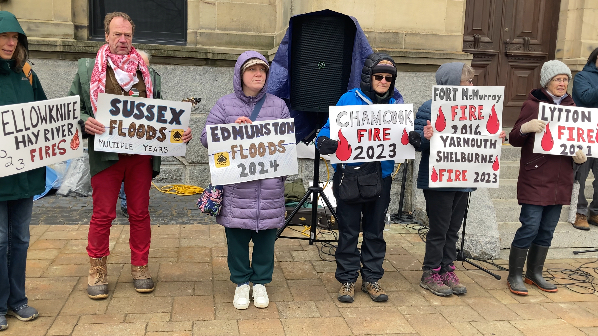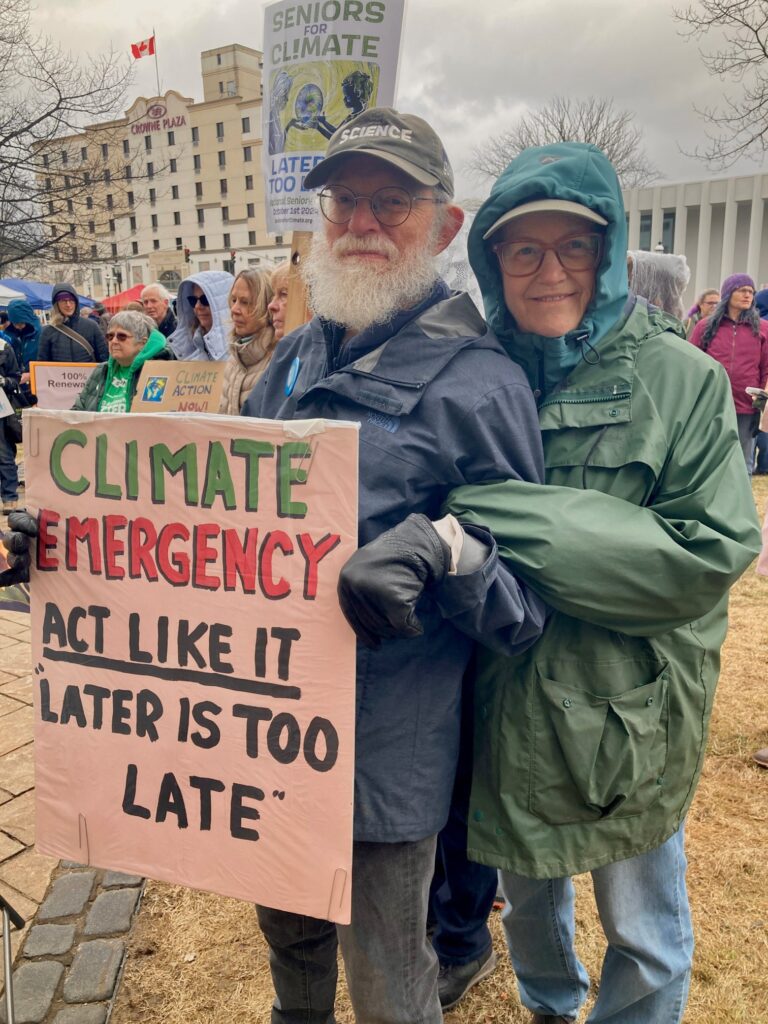Every measure of climate showcases our failures
Jim Emberger • Telegraph Journal, Jul 08, 2035
On Earth Day, “Seniors for Climate” rallied at the legislature to remind governments that solutions to recent economic turmoil must reflect climate science.
Unexpectedly, Premier Susan Holt visited the rally and delivered an enthusiastic address in support of the rally’s message. Days later, she contradicted her uplifting remarks by promoting gas and bitumen pipelines, and LNG exports as Canadian nation-building solutions. That she didn’t recognize her contradictions places her in a new constituency that accepts industry propaganda that climate change can be solved, while burning more fossil fuels.
It’s an alluring belief, as it offers politicians an easy way to address our economic circumstances using resources we possess. But as the saying goes, “if it sounds too good to be true…”
Climate science unambiguously concludes that climate change is here now, and humans are the cause, primarily by burning fossil fuels. Thus, any climate solution must begin with a reduction in fossil fuels. Projects that increase fossil fuels must be rejected.
The latest update from the International Panel on Climate Change warns us that, “Things aren’t just getting worse. They’re getting worse faster. We’re actively moving in the wrong direction…”
Every measure of climate showcases our failures. 2024 brought record increases in CO2 and temperatures, and was the first year to exceed the Paris treaty limit of a 1.5℃ increase.
Record melting of polar ice and permafrost, and record sea-level rise are transforming northern Canada’s landscapes, livelihoods and ecosystems. Western glaciers are melting at twice their previous rate.
In Manitoba and Saskatchewan, as premiers nearby promoted fossil fuel projects, massive fires – made five times more likely by climate change – burned uncontrolled.
Climate enhanced fires that char vast areas, destroy entire municipalities, cause thousands of evacuations, and export clouds of toxic air are experiences recently shared by British Columbia, Alberta, Quebec, Ontario and Nova Scotia. The Maritimes watch storms devour their coastlines.

Climate science unambiguously concludes that climate change is here now, and humans are the cause, primarily by burning fossil fuels. Thus, any climate solution must begin with a reduction in fossil fuels. Projects that increase fossil fuels must be rejected, argues Jim Emberger of the New Brunswick Anti Shale Gas Alliance.
One of every four Canadians claims to have been personally affected.
Such catastrophes, combined with extreme droughts, heatwaves, floods, and untimely heavy precipitation on every continent are creating food and water shortages and high prices. Priced a pound of coffee lately?
Increased warming and acidity from CO2 have pushed oceans close to, or beyond, tipping points, threatening food chains and vital life sustaining processes.
This has occurred with only 1.5℃ of increased warming. There is a small chance of hitting 2℃ at least one year in the next five. Every tenth of a degree brings new dangers, misery, and fears of tipping points – some irreversible.
Despite this overwhelming evidence, policy makers blindly accept delusional industry claims that ‘carbon capture and storage’ (CCS) will permit continued burning of fossil fuels, because CO2 can be captured, then stored underground.
Yet, a decade of CCS efforts have not produced a single successful project. They’re too expensive and cannot remove significant quantities of CO2.
“Climeworks,” a CCS poster child project, reported that in one year it removed only the CO2 emissions of “a dozen long haul trucks” – not even the amount produced by its own machinery. It cost 10 times more than forecasted. Another Texas marquee project recently leaked a substantial amount of stored CO2, spotlighting another problem. Underground storage wells will require monitoring forever, meaning never-ending taxpayer subsidies. CCS is a diversion designed to prolong the fossil fuel industry’s existence, it’s not a tool to address climate change.
Fossil fuel proponents also argue that Canada only produces 1.4 per cent of global greenhouse gas emissions, so let’s just wait until big polluters solve climate change. In fact, with 195 nations dividing the emissions pie, our 1.4 per cent makes us the No. 9 carbon polluter, lagging only the largest countries. We’re the only G7 country that has actually increased and not reduced emissions.

Signs at the Earth Day rally warned, “Later…is too Late.” That’s a fact, not a slogan.
David King, former UK chief scientific advisor, who chairs the Climate Crisis Advisory Group, was recently asked about Canada’s nation building plans. He noted, “In the UK, we have reduced our carbon dioxide footprint from 12 tonnes per person in 1995 to something like six tonnes, whereas you guys in Canada are well over 20 tonnes per person. So Canada has an enormous amount of work to do to demonstrate that it understands why we’re all suffering from these extreme weather events, and why the future of humanity is now severely at stake.”
Such a demonstration must acknowledge that even while we use existing fossil fuels judiciously during transition, we will not increase production of the most carbon polluting sources of oil and gas (tar sands, fracked gas, LNG).
There isn’t even a compelling economic argument. The International Institute for Sustainable Development’s assessment finds that up to 66 per cent of future Canadian oil and gas investments could be unprofitable, as global demand falls.
Citizens seem to understand this. A recent Abacus Data poll found that Canadians prefer clean energy proposals over fossil fuel proposals by a two to one margin. Climate change is affecting us now.
Our nation building projects must reflect that reality.
Signs at the Earth Day rally warned, “Later…is too Late.” That’s a fact, not a slogan.
~ Jim Emberger is spokesperson for the New Brunswick Anti Shale Gas Alliance.
